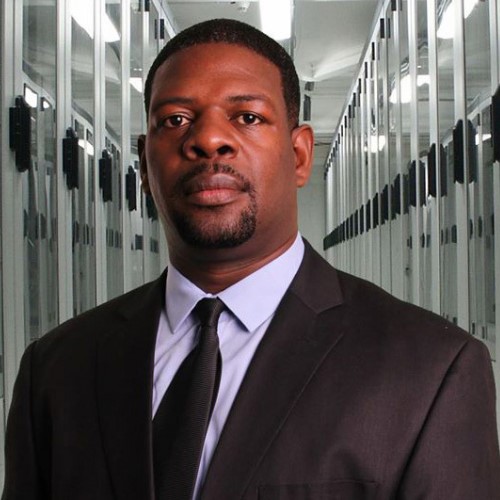Online Master of Education (MEd) in Cyber Science
![]()
Earn an MEd in Cyber Science and meet the demand for educators with the expertise to teach cybersecurity at any level.
Education in the field of cybersecurity faces many challenges – and these challenges are only expanding as our society increasingly relies on the use of technology in everything that we do.
The MEd in Cyber Science is designed to prepare the next generation of cyber educators. This research-intensive degree program enables current educators and industry professionals to develop advanced expertise through industry-informed curriculum, hands-on training, and practical research experience.
As an MEd in Cyber Science student, you’ll learn by doing – developing and assessing real courses and performing lectures for our BS and MS in Cybersecurity programs. You’ll also conduct original research in your cyber education area of interest under the guidance of a dedicated thesis chair. You’ll graduate with published work, contributing to the growing field of cyber science education.
What you’ll gain with an MEd in Cyber Science:
- Comprehensive understanding of the links between pedagogy and cybersecurity and their impact on the educational landscape
- Deep proficiency in the application of STEM principles, computer science, networking, and information technology to the academic platform across different levels
- Technical knowledge, including operating system principles for information assurance and cybersecurity
- Practical experience applying educational and cybersecurity theories to real-world cyber science challenges
- Insight into the legal aspects of computer security and information privacy
- Specialized expertise in your area of interest, whether in pedagogy, curriculum design and assessment, and evaluating emerging lab, classroom technologies, and different levels of education, such as K-12, community college, 4-year, or special needs
- Exposure to the academic publishing process and practical research experience
- Advanced knowledge and opportunities in teaching and research
- The opportunity to contribute new ideas and knowledge to an evolving field
- Enhanced career prospects as a subject matter expert
- In-demand skills, such as educational leadership, communication, and critical thinking
- The mindset for continuous learning in diverse and rapidly growing areas of cyber science education
With an MEd in Cyber Science, you’ll explore sound pedagogical principles and basic foundations for the many facets of cyber science and gain education leadership skills that not only enable you to advance your career in research and teaching, but also make you a valuable asset to the many organizations and industries worldwide that are in need of experienced cyber professionals, team leaders, and innovators.
Whether you aspire to be a teacher or a learning systems administrator, an MEd in Cyber Science positions you at the forefront of the field of cyber science education and offers a platform to make a meaningful impact through fulfilling and dynamic careers.
An MEd in Cyber Science prepares you to lead in these roles:
- Administrator (Chair, Dean, VP)
- Cyber Faculty/Professor
- Cyber Instructor/Educator
- Cyber Instructional Curriculum Assessor/Evaluator
- Cyber Instructional Curriculum Developer
- Educational Researcher
- Cyber Policy and Strategy Planner
- Cyber Workforce Developer and Manager
- Director of Curriculum Development and Course Delivery
- Lab and Classroom Designer
- Learning Systems Administrator
- Manager/Team Leader
- Research & Development Specialist
Graduates apply their expertise as educators who are teaching at all levels and working in related roles such as subject matter experts, team leaders, and innovators within corporations, government agencies, and national defense across the cyber industry and beyond.They also pursue careers in academia, teaching and conducting research at top institutions, and lead innovation through research & development roles. Some MEd in Cyber Science graduates choose to further their education with a doctorate, as with Capitol Tech’s EdD in Cyber Science program.
Characteristics of an MEd
The MEd is a research-intensive degree designed for current educators and industry professionals who want to advance their knowledge and opportunities in teaching and research to advance their careers, or before starting a doctorate program.
Students pursue an MEd degree to:
- Gain practical research skills and experience
- Design and conduct original research in an area of interest
- Enhance their teaching expertise in a specific field
- Build in-demand education leadership skills
- Advance their careers in academia and leadership roles
- Prepare for doctorate programs and other research opportunities
- Contribute new knowledge to emerging fields
The Master of Education in Cyber Science program offers an introduction to the field of cyber education that enables you to develop a deep proficiency in the application of STEM principles, computer science, networking, and information technology to the academic platform. You’ll explore the impact of technology and cybersecurity issues on the educational landscape through hands-on learning opportunities that ask you to develop and assess courses, lecture in BS and MS in cybersecurity programs, and conduct original research in an area that interests you. The program’s flexibility lets you balance your studies with your career and tailor your research to your specific goals to gain knowledge and skills that translate directly to career advancement opportunities, while making a significant contribution to the field as a whole.
Why Capitol?
Expert guidance in master’s studies
Capitol Tech’s MEd in Cyber Science is supervised by faculty who are experts in cyber science and related fields – and since many of our faculty are currently working in cybersecurity, you’re taught up-to-date strategies and best practices from the world’s top practitioners.
Proven academic excellence
Designated National Center of Academic Excellence in Cyber Defense (NCAE-CD) by the National Security Agency, Capitol Tech is a leader in education technology and plays a crucial role in shaping the future of cyber education, from our award-winning cyber programs and expert faculty to our alumni, who are among the most sought-after innovators and tech leaders.
Our location is a center for cyber
Learn in the heart of the DMV and Washington, D.C. metropolitan area — home to 350% more cyber security professionals than the rest of the US combined and one of the largest concentrations of high-tech companies, from government agencies to defense contractors and other commercial enterprises.
Program is 100% online
Our MEd in Cyber Science is offered 100% online, with no on-campus classes or residencies required, allowing you the flexibility needed to balance your studies and career.
Faculty

Dr. Richard Baker
Dissertation Chair
Dr. Richard Baker is Dissertation Chair of Graduate Programs at Capitol Technology University. He previously served as associate professor in Indiana State University’s Department of Aviation Technology, and as executive director of the Center for Unmanned Systems and Human Capital Development. Richard holds a BS in mathematics and an MS in computer science from Indiana State University. He received his doctorate in information systems from Nova Southeastern University.

Dr. William Butler
Vice President
Dr. William (Bill) Butler is currently the Vice President of Academic Affairs at Capitol Technology University. Prior to this appointment in 2021, Dr. Butler served as Cybersecurity Chair for 8 years at Capitol Tech. Earlier in his career, he worked in the networking and IT industries as a network engineer and consultant for over 20 years. He also served as a joint qualified communications information systems officer in the U.S. Marine Corps and retired as a Colonel with 30 years of service (active and reserve). Dr. Butler holds a Doctorate in cybersecurity earned from Capitol focusing on preserving cellphone privacy and countering illegal cell towers (IMSI catchers).

Dr. Charles Conner
Associate Chair, Director of Engineering Labs
Dr. Charles (Chuck) Conner is Associate Chair of Engineering and Director of Engineering Labs at Capitol Technology University. He previously served as both an adjunct and full-time professor of Engineering at Capitol Technology University and has been instrumental in securing numerous ABET accreditations for the University. Dr. Charles Conner has worked in industry and academia since 1980. His specialty is digital signal and image processing. He started teaching (part-time) in 1984.

Dr. Kellep Charles
Chair
Dr. Kellep Charles is Chair of Cybersecurity programs at Capitol Technology University. He completed his Doctorate in Cybersecurity at Capitol Technology University. He also holds a Master of Science in Telecommunication Management from the University of Maryland University College and a Bachelor of Science in Computer Science from North Carolina Agricultural and Technical State University.

Dr. Ian McAndrew
Dean
An internationally recognized leader in research and expert on low-speed flight, Dr. McAndrew has five degrees: a PhD, two master’s degrees and two bachelor’s degrees. He is a Fellow of the Royal Aeronautical Society. Dr. McAndrew chairs several international conferences and journals and is invited to give keynote speeches all over the world. He started his career in the automotive industry as an engine designer, and has worked at several universities across the globe. Dr. McAndrew is Dean of doctoral programs at Capitol Technology University. An external examiner on the world wide stage (UK USA, Germany, Italy, Jordan, Japan, Australia, Greece and Kenya) his experience includes over 115 successful Doctorate successes.
Career Opportunities
Market Demand for Cyber Science Education Expertise
With nearly 2,000 attacks reported per organization each week in 2022, the education and research sector experienced the most attacks worldwide for every month in 2021 and 2022.
With its extensive sensitive data and limited cybersecurity resources, the education sector has been an appealing target for cybercriminals for a few years now.
Since 2018, ransomware attacks on the sector, including K-12 and higher education institutions, have cost the world economy over $53 billion in downtime alone. These attacks breached over 6.7 million personal records across 561 incidents, reports Comparitech.
Ransomware remains a major threat – the education sector reports the highest attack rate out of all industries in 2023. According to IBM, the average cost of a data breach in the higher education and training sector in 2023 was $3.7 million.
Nearly 95% of all digital breaches come from human error, reports Cybint. As emerging technologies, such as AI, become increasingly integrated into our daily lives, our safety depends on placing more effort into initiatives to educate people about how to use these tools safely and effectively.
The cybersecurity workforce shortage continues to grow each year due to increasing demand coupled with the annual departure of large numbers of existing data professionals reaching retirement age. In an effort to increase the pipeline of students into the field, there’s been a trend in education of non-STEM teachers increasingly being trained in how to teach cybersecurity in their classes.
Many institutions are looking for instructors who can incorporate cybersecurity expertise into education at all levels, but are struggling to find people with master's degrees in the domain of cyber science and teaching experience, or experience leading cyber initiatives.
An MEd in Cyber Science prepares you to respond to the challenges that arise with new technology and their impact on education. The demand for expertise in cyber science education will continue to grow as expanding technology applications call for education initiatives to fill the gaps in public knowledge so that these tools can be used safely.
Degree Details
Tuition & Fees
Tuition rates are subject to change.
The following rates are in effect for the 2024-2025 academic year, beginning in Fall 2024 and continuing through Summer 2025:
- The per credit charge for all other masters courses is $630 per credit hour.
- The active duty military tuition rate is $350 per credit.
- The retired military tuition rate is $530 per credit.
- The information technology fee is $40 per credit hour.
- High School and Community College full-time faculty and full-time staff receive a 20% discount on tuition for master programs.
Find additional information for 2024-2025 masters tuition and fees.


